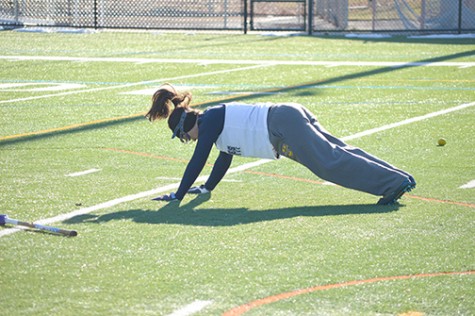Punishment necessary to maintain standards
Student-athletes are often held to a higher standard than non-athletes, due to the fact that they are a walking representation of the school, their team and their coaching staff.
Punishments brought to athletes are always up in the air. Some may wonder if the coaches are in charge of punishing students when they get in trouble, or if the coaches strictly leave it up to the police or the university’s leadership.
“Our Code of Conduct is very simple. One, do the right thing and two, team above self. It is a privilege, not a right, to be an NCAA athlete, and I have control over that,” said men’s lacrosse head coach Curtis Jaques.
Jaques continued to say that if a team member was given a drug or alcohol related sanction through the university that there would be consequences.
“Was the player doing the right thing by using drugs or alcohol? No. Was the player putting the team above themselves by using drugs or alcohol? Nope. So, yes there are consequences for breaking our code of conduct,” he explained.
In similar regards, Marcus Leaf, a senior baseball played stated, “If a player is caught drinking or caught with some sort of drug, they are suspended either for that week or a game, depending on how serious the matter is.”
“If a player gets in trouble outside of baseball and the coach finds out about it, he goes to the captains and has them take care of the situation, which usually results in early morning running or plate pushes in the green room,” Leaf continued.
Head coach of men’s basketball, Izzi Metz stated, “I try to be more of an educator and help young people mature. We try and recruit high character people who want to achieve in the classroom and on the court so that we don’t have a lot of disciplinary issues.”
When asked about student athletes getting in trouble outside of the gym, Jaques said, “It is my job to teach young men how to uphold those standards and be accountable for their actions on and off the field. I have many creative techniques to reinforce or reduce specific behaviors.”
“We treat each issue individually rather than having a uniform policy because a lot of times these are subjective,” Metz said.
The most important part of being a student-athlete is being a student. That means going to class, and keeping up their grades.
Leaf mentioned that the academic standing that each player on the team is asked to obtain is a 2.3. Anyone that falls below that has to go to mandatory study hall on Sunday mornings at 8 a.m.
Jaques chooses not to use a number to maintain academic standards, due to the fact that it would be a goal driven by outcomes.
“We like to set process oriented goals and reward growth. It serves no purpose for a student with a 3.5 potential to settle for a 3.0 because a team standard is 2.5,” he stated.
“My best friend in college slept through every class, showed up when he wanted to, and graduated with a 3.5. It was not fair and I will not allow my players to underachieve. My academic standard is specific to each player’s cumulative GPA. Each semester their GPA must be higher than their cumulative GPA. This tells me they are growing in the classroom. They are becoming better students, developing better study habits, and finding more passion the deeper they get into their major,” Jaques continued.
In movies or television shows, sports team traditions seem to be over exaggerated and made a bigger deal than they are. Leaf said that there are currently no traditions for the baseball team, they just ask each other to think about the team when put in difficult situations.
Similar to that, the lacrosse team has only been an NCAA Varsity team for 6 months. Coach Jauqes is excited to watch the team dynamics in action while developing the team traditions.
On the contrary, Amanda Stickles, a senior on the swim team, said, “Since we are a second year team there are no standing traditions. However, we have started to have pasta parties the night before big meets to get us ready. I think over time that will become a type of tradition.”
Another thing that seems to be prevalent in movies is players getting in trouble for forgetting a part of their uniform. It seems odd to think that one may forget something as simple as their ball cap, glove, or swimsuit at home when going to their game but it has happened.
Leaf said, “If a player forgets part of their uniform, the coach may take into consideration that the player is not focused and could result in not playing for that game in some cases.”
When it comes to the lacrosse team, Jaques said that he would use that opportunity to show the team how important it is to learn attention to detail. Instead of punishing the student that forgot something, he would punish the player who is in charge of packing the back-up equipment bag might be more effective for the team to learn attention to detail.”
Stickles, however said that there is no punishment on the swim team when someone forgets part of their uniform.
“Players are driven by different motives. It is my job to know the right buttons to press to reduce or reinforce specific behaviors,” Jaques said.
There were numerous coaches and athletes interviewed for this article; however, some athletes had no comment in fear of getting in trouble by their coaches.

Kim Hein is a senior Communication Studies major with triple concentrations in Strategic Communication/PR, Rhetorical Studies and Broadcast Production....